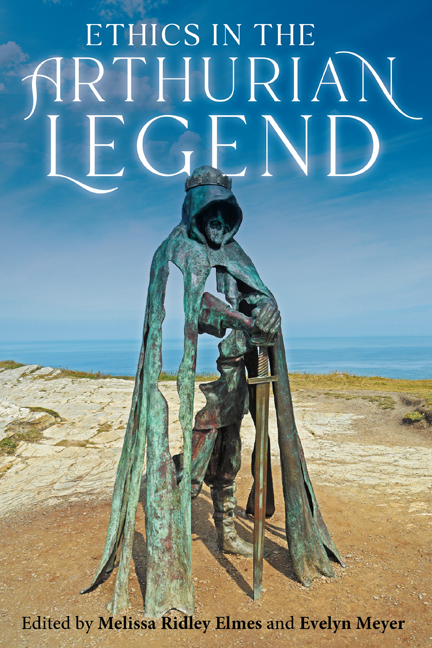Book contents
- Frontmatter
- Contents
- List of Contributors
- Foreword
- Acknowledgments
- Introduction
- 1 Arthurian Ethics before the Pentecostal Oath: In Search of Ethical Origins in Culhwch and Olwen
- 2 Too Quickly or Not Quickly Enough, Too Rash and Too Harshly: The Arthurian Court’s Lack of Ethics in Hartmann von Aue’s Erec and Iwein and Wolfram von Eschenbach’s Parzival
- 3 The Ethics of Arthurian Marriage: Husband vs Wife in Hartmann von Aue’s Iwein
- 4 Arthurian Ethics and Ethical Reading in the Perlesvaus
- 5 Translation Praxis and the Ethical Value of Chivalry in the Caligula Brut
- 6 Imperial Ambitions and the Ethics of Power: Gender, Race, and the Riddarasögur
- 7 Lowland Ethics in the Arthur of the Dutch
- 8 Contesting Royal Power: The Ethics of Good Lordship, Sir Gawain and the Green Knight, and the March of Wales
- 9 “As egir as any lyoun”: The Ethics of Knight-Horse Relationships in Lybeaus Desconus
- 10 Malory’s Ethical Dinadan: Moderate Masculinity in a Crisis of Hypermasculine Chivalry
- 11 Virtus, Vertues, and Gender: Cultivating a Chivalric Habitus in Thomas Malory’s Tale of Sir Gareth
- 12 Kingly Disguise and (Im)Perception in Three Fifteenth- Century English Romances
- 13 “Adventure? What is That?” Arthurian Ethics in/and the Games We Play
- 14 The Ethics of a New Edition of Sir Thomas Malory’s Le Morte Darthur – and More Evidence for the Superiority of the Winchester Manuscript
- 15 The Ethics of Writing Guinevere in Modern Historical Fiction
- Afterword
- Index
1 - Arthurian Ethics before the Pentecostal Oath: In Search of Ethical Origins in Culhwch and Olwen
Published online by Cambridge University Press: 10 January 2024
- Frontmatter
- Contents
- List of Contributors
- Foreword
- Acknowledgments
- Introduction
- 1 Arthurian Ethics before the Pentecostal Oath: In Search of Ethical Origins in Culhwch and Olwen
- 2 Too Quickly or Not Quickly Enough, Too Rash and Too Harshly: The Arthurian Court’s Lack of Ethics in Hartmann von Aue’s Erec and Iwein and Wolfram von Eschenbach’s Parzival
- 3 The Ethics of Arthurian Marriage: Husband vs Wife in Hartmann von Aue’s Iwein
- 4 Arthurian Ethics and Ethical Reading in the Perlesvaus
- 5 Translation Praxis and the Ethical Value of Chivalry in the Caligula Brut
- 6 Imperial Ambitions and the Ethics of Power: Gender, Race, and the Riddarasögur
- 7 Lowland Ethics in the Arthur of the Dutch
- 8 Contesting Royal Power: The Ethics of Good Lordship, Sir Gawain and the Green Knight, and the March of Wales
- 9 “As egir as any lyoun”: The Ethics of Knight-Horse Relationships in Lybeaus Desconus
- 10 Malory’s Ethical Dinadan: Moderate Masculinity in a Crisis of Hypermasculine Chivalry
- 11 Virtus, Vertues, and Gender: Cultivating a Chivalric Habitus in Thomas Malory’s Tale of Sir Gareth
- 12 Kingly Disguise and (Im)Perception in Three Fifteenth- Century English Romances
- 13 “Adventure? What is That?” Arthurian Ethics in/and the Games We Play
- 14 The Ethics of a New Edition of Sir Thomas Malory’s Le Morte Darthur – and More Evidence for the Superiority of the Winchester Manuscript
- 15 The Ethics of Writing Guinevere in Modern Historical Fiction
- Afterword
- Index
Summary
Despite a clear understanding that the legend has deep roots in the medieval Welsh literary tradition and, in fact, originated in Wales, comparatively few Arthurian specialists engage with the Welsh materials even in translation. This is unfortunate, as these texts provide a great deal to think with, especially considering the early development of Arthur as legendary and literary king. In this essay, I examine ethical considerations in the earliest longform medieval Arthurian narrative, the c. twelfth-century Welsh Culhwch and Olwen, with an eye to how the narrative constructs Arthur as king in relation to his knights and subjects and how that representation, in turn, forms the contours of an ethics of Arthurian kingship and knighthood that poets in other traditions throughout the medieval period inherited and adapted either to uphold, develop, critique, or reject in favor of more culturally relevant approaches to these characters.
Modern ethical inquiry focuses on the rightness or wrongness of actions and ways of being, where medieval ethical inquiry focused more so on the goodness or badness of lives. In both cases, ethics in general deals with the rightness or wrongness of a given course of action, while virtue, essential particularly in questions of medieval ethics, signifies certain specific points – for example in Christianity, the cardinal virtues of prudence, fortitude, justice and temperance – operating within an ethical program. Framed by the writings of philosophers such as Augustine, Boethius, Alcuin, and Eriugena, medieval ethics was preoccupied with ideas about living well, which were also ideas about virtue and human excellence. These ideas were grounded in the understanding that “human beings are metaphysical straddlers” with “one foot in eternity and the other foot in time” and therefore, in most of Western Europe, were not separable from Christian belief and thought. Ultimately, the goal is to transcend mortal, temporal life in favor of the virtue of contemplative life. There is a constant tension between civic and contemplative life that must be mediated, and this tension is certainly observable in the Arthurian legend, particularly in the juxtaposition of the Grail Quest with the program of chivalry in medieval Arthurian romances.
- Type
- Chapter
- Information
- Ethics in the Arthurian Legend , pp. 8 - 34Publisher: Boydell & BrewerPrint publication year: 2023

